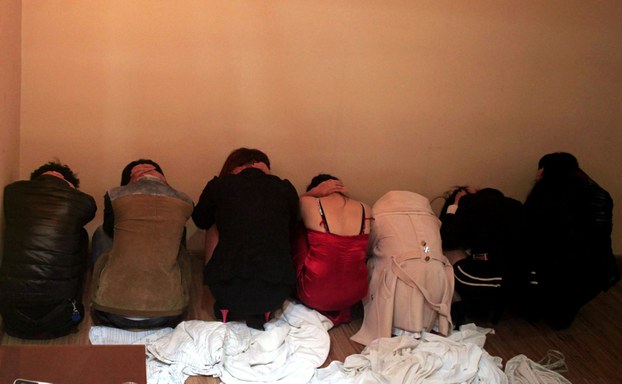China's 're-education' for sex workers similar to labor camps: Lawyers
| Publisher | Radio Free Asia |
| Publication Date | 11 June 2014 |
| Cite as | Radio Free Asia, China's 're-education' for sex workers similar to labor camps: Lawyers, 11 June 2014, available at: https://www.refworld.org/docid/53b15bee28.html [accessed 26 May 2023] |
| Disclaimer | This is not a UNHCR publication. UNHCR is not responsible for, nor does it necessarily endorse, its content. Any views expressed are solely those of the author or publisher and do not necessarily reflect those of UNHCR, the United Nations or its Member States. |
2014-06-11
 Workers at an entertainment venue in Dongguan crouch by a wall during a police raid on Feb. 9, 2014. AFP PHOTO
Workers at an entertainment venue in Dongguan crouch by a wall during a police raid on Feb. 9, 2014. AFP PHOTO
While the ruling Chinese Communist Party abolished its controversial "re-education through labor" camp-based punishment system at the end of last year, a similar system remains in place under another name, according to a letter signed by dozens of prominent legal experts.
The lawyers are calling for the abolition of the police-run "custody and education" system, which they say resembles the "re-education through labor" system in all but name, and has no basis in Chinese law.
"The custody and education system was set up under [administrative] regulations banning prostitution," the Beijing Express newspaper quoted the letter as saying.
The letter says the entire system of 200 re-education facilities has no basis in Chinese law, which forbids the state to deprive citizens of their freedom without any basis in legislation.
The first custody and re-education facilities began to be built in 2002, in line with a 1993 directive from China's cabinet, the State Council, which ordered that those found engaging in sex work should be given "legal and moral" education, subjected to tests for sexually transmitted diseases and organized to take part in productive work.
Violation of rights
According to U.S.-based rights activist Liu Qing, such facilities are a blatant violation of the rights of Chinese citizens.
"The Chinese Communist Party has a lot of methods by which it exerts its rule of terror," Liu said. "These methods don't require any kind of judicial procedures, and the police can do whatever they like."
"Custody and education is just one of a plethora of ways in which the Chinese government takes away people's freedom and tramples on their rights," he said.
Wu Fan, editor in chief of the overseas Chinese-language magazine Chinese Affairs, agreed.
"The custody and education program is actually re-education through labor in another guise," Wu said. "The party is never going to let go of these systems that are so useful for controlling people."
He said the custody and education facilities are now being increasingly pressed into service to deal with large numbers of ordinary Chinese who pursue complaints, often for many years to no avail, against officials.
"They lock them up in custody and education centers run by offices in all locations across the country, and entirely deprive them of their personal freedom," Wu said.
Legal consciousness
He said the lawyers' letter was part of an awakening in legal consciousness that occurred around 2000.
"This occurred in particular among legal scholars and experts, and lawyers, who began to wake up and take part in civil rights activities," he said.
The legal experts' letter was triggered by the detention last month of television actor Huang Haibo, who was detained for 15 days by police before being sentenced to six months' in a custody and education facility.
Jiang Ping, professor at China University of Political Science and Law, and Tian Wenchang, director at the Criminal Specialty Committee of the All China Lawyers Association were among those who signed.
It called on the Standing Committee of China's parliament, the National People's Congress (NPC), to abolish the system, under which a person can be incarcerated by police for up to two years without trial for involvement in the sex industry, whether as a sex worker or a client.
The party's powerful Central Propaganda Department moved swiftly to minimize coverage of the story in China's tightly controlled media, however.
"Do not republish the...article 'What Is the Basis for the 'Custody and Education' Law?'" the department told editors in a directive dated June 6.
"Please immediately delete if already republished," said the directive, which was leaked by Chinese journalists before being translated and collated by the U.S.-based China Digital Times website.
Reported by Xi Wang for RFA's Mandarin Service. Translated and written in English by Luisetta Mudie.
Link to original story on RFA website
